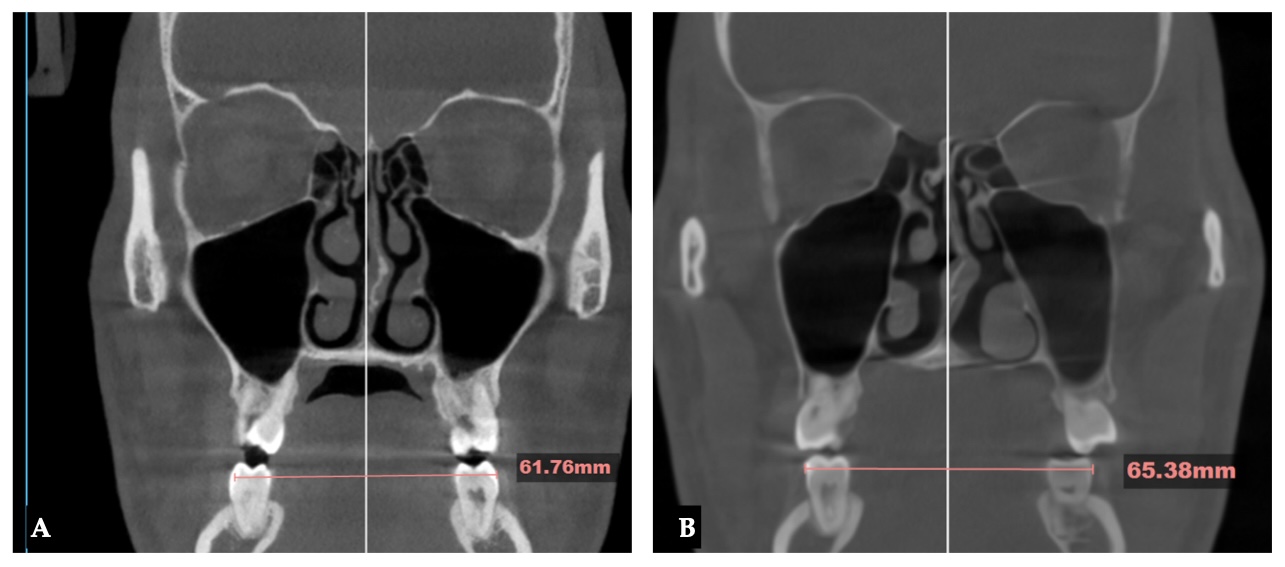
.
Understanding the Anatomy of the lower Jaw
The MARPEFACe protocol was created by Dr. Koval, who noticed big changes when treating patients with special 3D-printed aligners. This method was designed to make sure the lower jaw (mandible), even though it’s built very differently, can follow the same reshaping and resizing strategy as the upper jaw (maxilla).
Let’s start with the basics. The upper jaw is called the maxilla. It’s made of two halves that meet in the middle at a line called the midpalatal suture. Behind it, it also connects to the sinuses and the rest of the skull. You can imagine it like a cake cut into two halves, with teeth as the candles. When we use MARPE, it pushes the two halves apart, just like separating the cake.
The lower jaw (mandible) is different. It’s more like a solid horseshoe-shaped bone, not two halves. Because of this, it’s harder to separate, and it grows in a different way. Instead of splitting it, Dr.Koval uses surface reshaping and tooth-related movements to help it expand.
Dr. Koval’s method has shown impressive results in widening the lower jaw using this special approach.
Can I do MARPE alone without aligners?
MARPE isn’t really used as a treatment all by itself. There are important reasons why doctors don’t usually plan MARPE alone:
- MARPE makes big changes to the face and skull. It can widen the cheekbone area (zygomatic arch width), increase the space in the eye sockets (orbits), and improve the size of the nasal cavity, sinuses, and other nearby structures.
- It changes the bite. When the upper jaw expands, the way the teeth meet changes. This affects chewing and even how you talk.
- The lower jaw has to adjust too. Since the upper jaw gets bigger, the lower jaw needs to be repositioned to fit correctly.
- Planning is important. Both jaws need to be carefully planned together on a timeline, instead of just waiting to see what happens after MARPE.
What is the Duration of MARPEFACE treatment?
The MARPEFACE protocol, created by Dr. Koval, has several important goals:
- Help the face develop properly by carefully separating the upper jaw (maxilla).
- Keep the nasal septum (the wall inside your nose) in the right place.
- Check for any facial asymmetry (unevenness) before treatment and plan for it.
- Look at any existing dental work, like implants, crowns, or veneers, and adjust the plan if needed.
- Improve breathing by increasing airflow through the nose and reducing nasal blockage.
- Move both the upper and lower jaws forward to encourage healthy facial growth.
- Make the airway (pharyngeal airway) larger to improve breathing.
- Improve neck posture and head position.
- Reduce TMJ/TMD (jaw joint) problems that come from airway issues.
Your Choice of MARPE provider is an important decision
Choosing the right treatment for airway development is personal and needs guidance from a professional. The most important step is understanding the plan your doctor uses, because that’s what leads to successful results.
Sometimes, MARPE expansion is done too little in order to avoid working much on the lower jaw (mandible). But that’s not how the MARPEFACE protocol by Dr. Koval works. This protocol was designed to solve the challenges of expanding the lower jaw. With MARPEFACE, lower jaw expansion is possible and planned from the very start, along with moving the jaw forward.
Take the First Step Towards Better Airway Health in Boca Raton
If you're considering MARPE or MSE treatment for airway development, Dr. Svitlana Koval in Boca Raton is here to help. With a comprehensive approach to orthodontic care, Dr. Koval offers personalized consultations to determine the best treatment for your needs. Don't wait to improve your health and well-being—reach out to us today at (954) 600-2056 to schedule your appointment and take the first step towards a healthier future.


